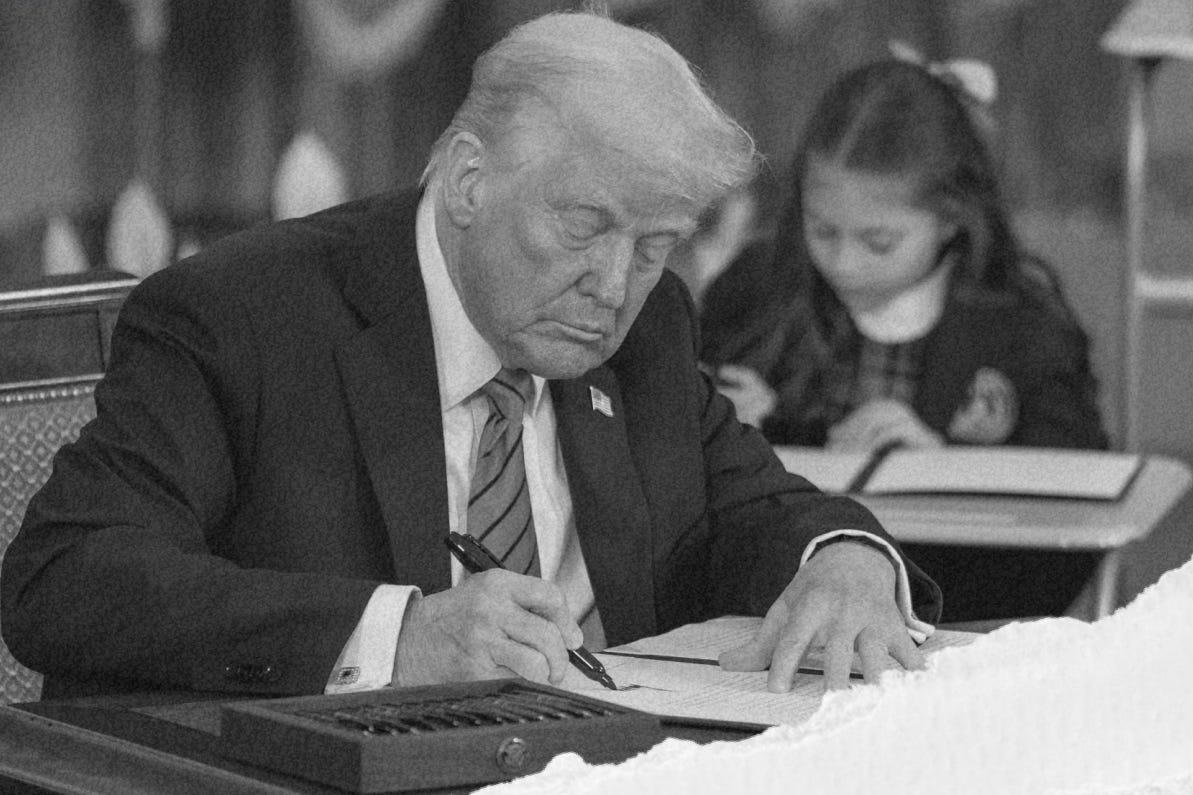If You Still Believe in America, It’s Time to Prove It.
This isn’t about left or right—it’s about whether you’re willing to look away while democracy fades.
The Republican Party was once rooted in clear, principled ideals: limited government, strict adherence to the Constitution, and a no-nonsense approach to leadership. But that party is barely recognizable today. What began as conservatism has veered into chaos—an authoritarian White House, and a president openly defying both the Constitution and the Supreme Court. It’s not too late to walk away from MAGA. But the window is closing fast. Stay, and your party won’t be the only thing that falls.
How Trump Took Over the Republican Party
After eight years of Barack Obama, Democrats assumed the momentum was theirs. Hillary Clinton expected to face a seasoned Republican opponent. Instead, she faced Donald Trump—someone who broke every rule of traditional politics. Many of us, on both sides, underestimated what a turning point his rise would be.
Trump didn’t run on conservative principles or thoughtful policy—he ran on spectacle. While others laid out strategies, he shouted promises. While critics tried to hold him accountable, he attacked the media and sowed distrust in anyone who questioned him. This wasn’t politics as usual—it was the start of something far more dangerous.

In any healthy democracy, a free press functions as a watchdog—a necessary check on those in power. But Trump understood something chilling: if you discredit the watchdog, you can act with impunity. His attacks on the media weren’t just bluster; they were strategic. By branding journalists as "the enemy of the people," he tapped into a long-standing distrust among voters who felt overlooked and disrespected. Suddenly, facts became optional, and truth became partisan.
Truly, this is straight from the authoritarian playbook. Undermine public trust in independent sources of information, and you create a vacuum. Then fill that vacuum with your own version of reality. It is one of the first steps in dismantling democratic norms, because once people stop believing what they see, hear, or read—and once they believe only what a single leader tells them—the guardrails of democracy disappear faster than you can say ‘freedom’.
Trump didn’t just attack bad coverage—he attacked the very idea that journalism should hold power accountable. After Obama, the Republican Party was desperate for something new, something disruptive. Trump delivered that by doing the unthinkable. He didn’t just break the rules—he convinced people the rules no longer mattered.
He taps into something deeply human: our desire for certainty, our instinct to avoid discomfort. Nobody wants climate change to be real—so he tells us it isn’t. And instead of questioning it, people follow. That’s not policy. That’s propaganda. And once a leader can convince millions to believe what's comforting over what's true, democracy doesn't just weaken—it begins to disappear.
Undermining Institutions: The Slow Collapse from Within
Once truth became flexible, institutions were next. Trump didn't need to rewrite laws—he just ignored them. When courts ruled against him, he questioned their legitimacy. When election results didn’t go his way, he called them rigged. And when federal agencies did their jobs, he branded them part of the “deep state.” This wasn’t just a rejection of political opponents—it was a rejection of the entire system meant to hold leaders accountable.
The genius—and danger—of Trumpism is that it doesn’t destroy democracy in a single blow. It wears it down bit by bit. It turns watchdogs into villains, judges into enemies, and elections into spectacles of doubt. And the longer Republicans stay silent, the harder it becomes to turn back.
In a phone call with acting Deputy Attorney General Richard Donoghue, Trump said, “Just say the election was corrupt and leave the rest to me and the Republican congressmen.” Trump didn’t (and doesn’t) care about actual evidence—he only needed the appearance of legitimacy to overturn the results. The DOJ didn’t bend, but the fact that Trump even asked it to is a clear sign that American democracy was and is at risk under a Trump White House.

In just these first 100 days of Trump’s second term, it hasn’t gotten better. More than ten federal courts have temporarily halted or rejected actions by the Trump administration on issues such as spending or his attempt to remove birthright citizenship—something that’s written in the Constitution. Dozens more lawsuits against the administration’s early actions are pending.
In a highly publicized case, President Trump recently deported a Maryland father—without due process—to a maximum-security prison in El Salvador. The White House claims the man, Abrego Garcia, is a member of MS-13, yet has provided no evidence to support the accusation. When a federal court ordered the administration to return him to the U.S. and grant him the legal rights he was denied, officials claimed it was too late—Garcia had already been deported and was now outside their jurisdiction. As a result, Trump officials are facing possible contempt of court.
Even more alarming, in the midst of this, Trump has floated the idea of deporting American-born citizens who, according to his administration, have committed “heinous crimes.” If the president can deport an illegal resident without due process, what’s stopping him from doing the same to citizens? The Constitution is not a suggestion—it is the law. And yet, this is so profoundly unconstitutional, so bizarrely authoritarian, that it almost defies explanation.
And this is happening less than 100 days into Trump’s second term.
Let’s be clear: no one wants violent criminals on our streets. But due process isn’t optional—it’s the foundation of our legal system. If the government can decide who is and isn’t entitled to it, then we are not a democracy. We’re something else. We’re an autocracy in the making.
The Reckoning for the Good Republicans
There are still Republicans who believe in integrity, in the Constitution, in limited government, and the rule of law. Some stayed silent in 2016, hoping the storm would pass. Some held their nose and voted red because the alternative felt worse. Others walked away entirely.
But silence is no longer a shield—it’s a choice. And that choice now has consequences.
The Republican Party doesn’t need more loyalists. It needs more patriots—people brave enough to say, this isn’t what we signed up for. You don’t have to agree with Democrats. You don’t even have to like them. But if you still believe in democracy, in the peaceful transfer of power, in due process and equal protection under the law—then you already know: this isn’t conservatism. This is authoritarianism, wrapped in a flag and hiding behind a Bible.
So what can you do? Speak. Loudly. Relentlessly. Whether it’s to a crowd of thousands or a conversation with one friend—say the truth. Say what you see. Tell the story others are afraid to tell. Because the only thing stronger than propaganda is the courage to reject it.
History won’t just ask what Trump did. It will ask what the rest of us allowed. And one day, maybe even soon, your children or grandchildren will look back and ask:
"Why didn’t anyone do something to stop this?"
Make sure you have an answer.





